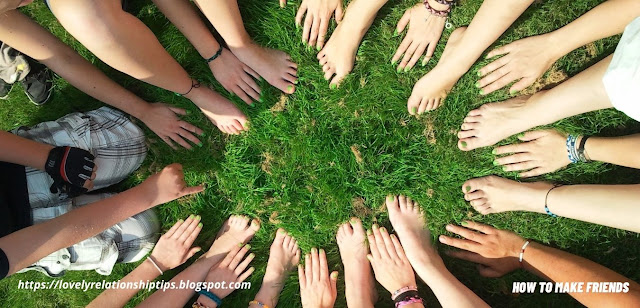Learn How To Make Friends With Anyone…Anywhere ! Making friends and meeting new people might be difficult, but with a little effort and a w...
 |
Learn How To Make
Friends With Anyone…Anywhere!
Making friends and
meeting new people might be difficult, but with a little effort and a
willingness to venture outside of your comfort zone, you can quickly make
friends.
Begin by going out there and seeking social opportunities, such as a local club or volunteer group. Take some time to get to know new individuals and hang out with them once you've started meeting them.
Friendships that are healthy are connected to improved cardiovascular health, reduced blood pressure, less depression, and a longer lifespan. So it's never a bad idea to attempt to make new friends.
Advertisement
10 Best Tips On How To Make New Friends
1. Dressing sharply:
Dressing sharply has long been associated with increasing one's self-esteem. You don't have to be attractive to appear nice; with the appropriate clothes and complementary accessories, any man or woman may look beautiful. When someone realizes they look nice, it almost immediately manifests in their outward manner as well as their inner self-assurance.
Advertisement
2. Smiling:
The widely held belief that appearances matter, and that they matter a lot, is sad but often accurate. Smiling a lot also helps Since it portrays an open and welcoming attitude. People are more likely to approach and befriend someone who is smiling than someone who is reserved and guarded. Another technique to guarantee that others are drawn to a person is to keep one's emotions under check.
Learning to be more
relaxed and tranquil gives the appearance of happiness and contentment, which
translates to emotional maturity and security. People can interact better in
any situation when they don't have the "baggage" of insecurity.
3. Cleanliness:
Another appealing element is maintaining a minimum degree of cleanliness. Untidy people who smell terrible may be highly off-putting. Simple things like clean clothes and fresh breath are a very desired state to maintain.
Read: 16 Most Powerful Tips On How To Deal With Angry Husband
Another wonderful trait to
cultivate is the practice of continually inquiring about the overall well-being
of people. It demonstrates a loving and concerned attitude, which is highly
appealing.
Advertisement
See How
4. Complimenting:
When possible, complimenting others is not only a great
habit to get; it also instantly makes a person loved and relaxed. Many great
friendships and other partnerships have begun with a kind and complimentary
comment.
Maintaining eye
contact throughout a discussion is beneficial since it not only assures the
speaker of everyone's full attention, but it also offers everyone a sense of
respect and attentiveness.
The way a person walks frequently indicates the degree of confidence they have at any particular time. A fast stride with a straight posture conveys a strong sense of self-assurance. Both of these postures and motions have an impact on the chemical makeup of the body, which is reflected in the external character.
Advertisement
Listening to and being exposed to as many motivating media tools as possible is one of the finest methods to improve self-confidence. Many individuals are now attempting to develop the habit of listening to motivational lectures while commuting to work, in their leisure time, or during workout sessions.
These motivating seminars frequently include helpful tips and prompts that instill the confidence needed to succeed in any effort. As a result, the individual's degree of confidence might rise. Another source of confidence is learning to be appreciative of current events and objects in one's life.
Advertisement
This encourages people to be grateful for what they have and to see things in a more positive light.
It also aids in the development of a positive mindset, which allows for
the development of a more confident personality. speaking properly and loudly.
Another characteristic that might be advantageous is the capacity to practice
speaking properly and loudly.
With consistent and dedicated practice sessions, an individual might gradually gain the necessary confidence to be outspoken.
5. Determine the type of individuals you want to spend your time with:
The kind of individuals
with whom a person interacts on a daily basis will eventually determine the types
of behavioral patterns, they develop and practice. As people tend to conform to
their peers, this will almost always become apparent within a short amount of
time.
6. Try to understand them:
As a result, exercising caution when it comes to forming relationships with others is really choosing to be sensible and cautious. People around an individual, both socially and at work can pass on a variety of unpleasant and even harmful qualities.
If a
person wishes to advance in the workplace, he or she should constantly be in
the company of friendly individuals who are able to notice the individual's
potential and therefore be able to put in a good word when the time
comes.
However, in social situations, it may necessitate a more concentrated and still distinct approach. If you want to be socially relevant, mingling with individuals who are in the know is probably the best way to proceed.
Advertisement
Even name dropping may sometimes have
the desired consequences and elevate the individual to the next level of social
achievement.
If, on the other hand,
picking real friends is a requirement of any planned connection, then delving
into one's own self is the first and most essential step to take. Understanding
one's own unique wants and preferences can help friendship relationships to
develop and bloom.
Time is something that should not be wasted or taken for granted; thus, the sort of friends that an individual would like in his or her life should be carefully chosen based on his or her lifestyle and profession.
Wherever You Are, Strike Up A Conversation: It is not necessary for those who are open and outgoing to be able to begin up a conversation. With sufficient experience and the right tools, anyone can learn to connect in a pleasant manner.
7. Talk Freely:
The simplest approach to start a conversation is to make eye contact first. Making eye contact with the other person helps them to recognize and accept the offer to begin pleasant contact.
When this is done, both parties have established their interest, allowing a dialogue to begin. Smiling also facilitates the commencement of a discussion. Most people respond positively to a simple grin when it is delivered in a nice and non-obtrusive manner.
Anyone may start a discussion with a grin since the atmosphere is pleasant and open. Another method to start a conversation is to have a fair level of information about a certain related issue. It's worth noting that the substance of the talk must be relevant to the circumstance or scenario at this stage.
Advertisement
This would not only urge the other person to participate but it might also be viewed as a tool for establishing an impression. Of course, saying "hey" or "hello" in an old-fashioned manner is another approach to start a discussion.
Despite the fact that it is quite simple to implement, most individuals find it embarrassing to utilize this approach for fear of receiving a negative reaction. When trying to start up a conversation, it helps to seem decent.
Nobody likes to talk to someone who is untidy or unclean. Initiating a discussion can be extremely difficult and stressful for some people.
There are certain persons who suffer from low self-esteem difficulties and this type of condition can only be treated medically and physically. In general, though, if one has or projects a pleasant image, initiating a conversation should not be too difficult.
Advertisement
8. Make A Good First Impression:
No matter what others may think or say, first impressions are extremely important. Unfortunately, sometimes a person only has one chance to make a good first impression, and if it is not done correctly, there may not be a second time or a second chance.
As a result, in order to produce the greatest possible first impression, one should take the time to arm oneself with all of the finest and most favorable benefits available.
Because each meeting has its unique set of possibilities, the ability to make a strong first impression should be honed. In most cases, there are no possibilities to correct a mistake.
Another useful skill to master is how to feel at ease in any situation. When this technique is learned and the taught body language personifies the feeling of calm, people around you will be able to relax as well, avoiding any awkward first encounter jitters.
When it comes to establishing the first impression, an individual's physical appearance is equally crucial. However, this does not imply that you should dress extravagantly or improperly. Always dress appropriately and accessorize with the proper items.
Another requirement is to be well-groomed, and when all of these factors are combined, it creates a really attractive first impression package. It's also crucial to speak clearly and fluently.
It's aggravating when others around you can't hear or comprehend what you're saying. This gives off a bad initial impression.
Advertisement
9. Don't Come Off As a Taker:
Everyone is taught to share from an early age. Unfortunately, most of these characteristics are lost as children grow older, and this is especially true in the workplace. Today's selfish mentality is all too common, and it has to be addressed.
Being referred to as a taker isn't exactly a flattering moniker. Those around you will eventually make every attempt to avoid this personality and the bad trait it conveys. Essentially, a taker is someone who has no clue how to contribute and is accustomed to being catered to.
The selfish attitude of solely focusing on oneself and one's wants gives rise to this bad characteristic. When pursuing a negative characteristic, an individual tends to lose sight of everything around them and gets preoccupied with satisfying self-interests.
If left unchecked, this character characteristic can develop and grow to the point of inflicting harm to oneself as well as other others engaged directly or indirectly. To learn to recognize the first indication of being a taker, one must first grasp the character qualities that a taker exhibits.
Advertisement
Once this is realized, the individual may learn to avoid replicating these characteristics. One approach to show the taker mentality is to make it a practice of continuously directing the social lives of others around you.
Learning to be more adaptable and laid-back might be a good place to start. Another telltale indication of a taker is that they always take but never lend out their belongings. Many people are eager to take advantage of others for their personal gain.
A frequent feature of takers is their inability to relate to or listen to other people's issues. These people have a difficult time sharing and assisting others with their difficulties.
Read: How To Make Your Ex Want You Back
10. Be Genuine:
Most individuals can simulate being genuine for a short period of time, but others will ultimately be able to see through the mask and reveal the actual person behind it. Genuineness is something that everyone should strive for in their everyday lives.
Advertisement
There are several areas that may be addressed in order to practice being real, including the following:
- learning about oneself and how that persona connects to being genuine. Rather than being able to separate out and be distinct, some people get persuaded by current trends and seductive lifestyles. It is possible to make progress in molding a more real individual by determining which category corresponds to the individual.
- Spending time to explore and enjoy oneself is another excellent method to discover what makes up an individual's character. This insight is critical since most individuals put on a fake face in order to adapt to their current situation.
- Learning to keep to one's own beliefs and lifestyles regardless of what others are doing demonstrates a definite desire to stand out and be recognized, therefore intentionally shunning the fake façade in favor of the true thing.
- Abandoning the need to keep up with the newest trends also helps the individual to create an identity worth investigating and getting to know better by staying in one phase for a long time.
- Trying new things is usually a wonderful idea, but sticking with it even when it causes so much pain and anguish is not being true to oneself. One approach to be authentic is to
- Always be aware of the spoken word. If done in a polite and diplomatic manner, saying and meaning what is said is always appreciated.



















No comments